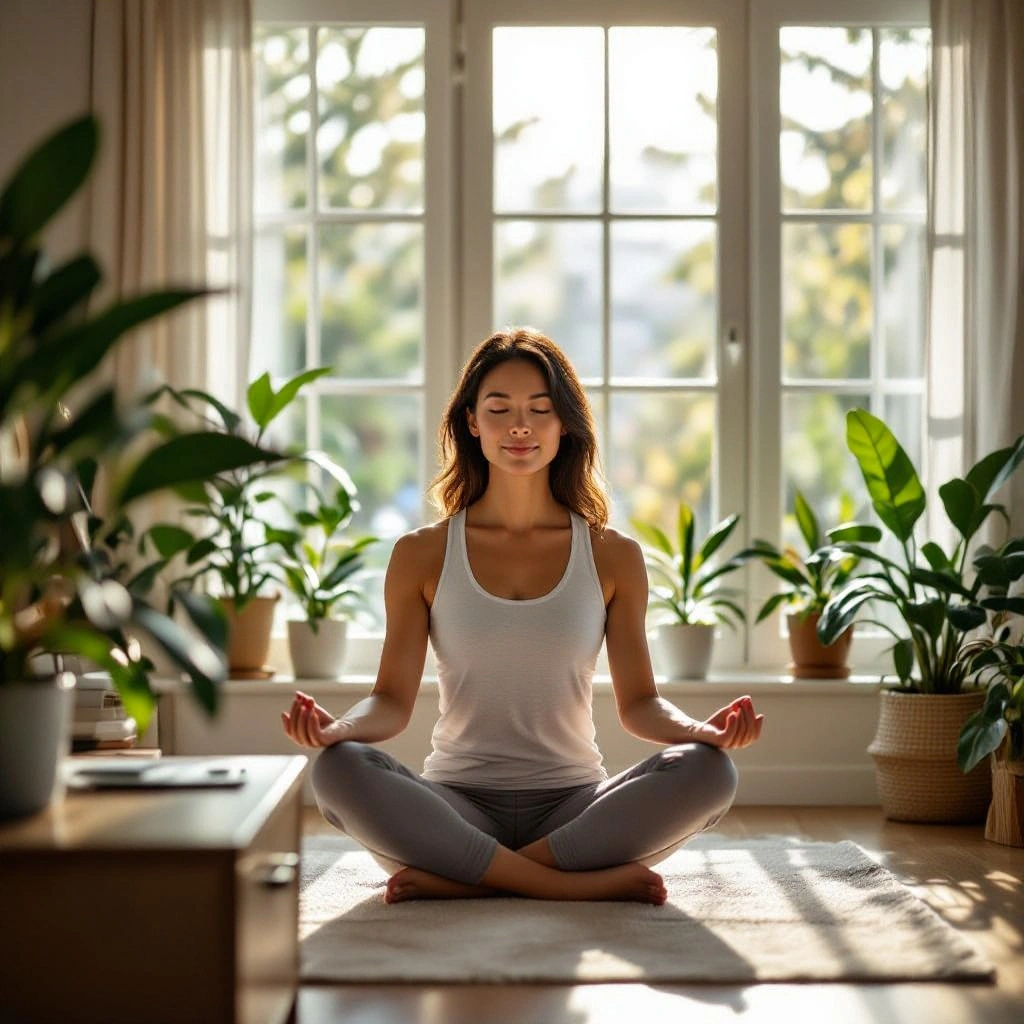Your Complete Guide to Thriving Independently
When you live solo, self-care isn’t just nice to have—it’s your lifeline to thriving independently. Without a built-in support system at home, you become both the caretaker and the cared-for. But here’s what most people don’t realize: this positions you perfectly to create the most personalized, effective wellness system possible.
Recent research shows that people who live alone often develop stronger emotional resilience and more diverse social networks than their coupled counterparts. The key is understanding that solo self-care goes far beyond bubble baths and face masks. It’s about building comprehensive systems across six essential dimensions that support your physical health, mental clarity, and overall life satisfaction.
Table of Contents
The Complete Solo Self-Care Framework
Think of self-care as your personal wellness architecture. Just like a building needs multiple structural elements to stand strong, your wellbeing requires attention across different dimensions. For solo dwellers, this becomes even more critical since you’re the primary person responsible for maintaining every aspect.
The six core dimensions of solo self-care are:
Physical Self-Care – Your body’s foundation for everything else
Mental Self-Care – Keeping your mind sharp and engaged
Emotional Self-Care – Processing feelings and building resilience
Social Self-Care – Cultivating meaningful connections
Practical Self-Care – Managing life’s necessities efficiently
Spiritual Self-Care – Finding purpose and deeper meaning
Research consistently shows that self-care behaviors are associated with more positive affect and reduced negative emotions, making this multi-dimensional approach essential for solo living success.
Physical Self-Care: Your Energy Foundation
Movement That Actually Fits Your Life
Forget the gym membership you never use. Solo living gives you complete freedom to design physical activity around your preferences, schedule, and space. Research shows that any activity that stimulates your mind or intellect contributes to overall wellness, and movement is one of the most effective ways to achieve this.
Home-Based Solutions:
- Morning yoga sequences in your living room
- Walking meetings for work calls
- Dancing while doing household chores
- Resistance band workouts in small spaces
- Stair climbing in apartment buildings
Community-Connected Options:
- Solo hiking with nature meetups
- Swimming at local community centers
- Cycling groups that welcome individual participants
- Tennis lessons or practice walls

The key is consistency over intensity. Research indicates that regular moderate exercise significantly impacts both physical and mental health, so choose activities you genuinely enjoy rather than what you think you “should” do.
Nutrition Without the Complications
Cooking for one doesn’t have to mean sad desk lunches or expensive takeout every night. Solo cooking can actually be more nutritious and creative than cooking for others since you’re only pleasing your own tastes and dietary needs.
Efficient Solo Nutrition Strategies:
- Batch cooking on weekends for easy weekday meals
- Investing in proper food storage to prevent waste
- Building relationships with local farmers market vendors
- Learning to scale recipes down appropriately
- Creating “ingredient themes” for the week to minimize shopping
Budget-Friendly Approaches:
- Buying versatile ingredients that work in multiple dishes
- Using your freezer strategically for portioning
- Growing herbs on windowsills for fresh flavor
- Joining community-supported agriculture (CSA) programs
- Learning preservation techniques like pickling and fermenting

Sleep as Your Superpower
Living alone gives you ultimate control over your sleep environment—use this advantage wisely. Quality sleep directly impacts every other dimension of self-care, making it a cornerstone of solo wellness.
Sleep Optimization for Solo Dwellers:
- Room temperature control (typically 65-68°F works best)
- Blackout curtains or eye masks for darkness
- White noise machines or earplugs for sound control
- Blue light filters on devices 2 hours before bed
- Consistent bedtime routines that signal rest time
Creating Sleep Sanctuary:
- Investing in quality bedding as a health expense
- Keeping electronics out of the bedroom
- Using aromatherapy or plants for air quality
- Ensuring proper mattress support for your sleep style
Mental Self-Care: Keeping Your Mind Sharp
Intellectual Stimulation Without School
Mental self-care involves keeping your mind engaged and growing. For solo dwellers, this becomes particularly important since you don’t have daily intellectual challenges that come from navigating relationship dynamics or household negotiations.
Solo-Friendly Mental Stimulation:
- Learning new languages through apps and conversation groups
- Taking online courses in subjects that genuinely interest you
- Reading across different genres and perspectives
- Engaging with podcasts that challenge your thinking
- Writing, whether journaling, blogging, or creative fiction
- Puzzles, games, and brain teasers that match your skill level
Community-Based Learning:
- Library lecture series and book clubs
- Community college continuing education classes
- Professional development workshops
- Local museum programs and cultural events
Research shows that intellectual engagement significantly contributes to emotional wellbeing and life satisfaction, making this dimension crucial for solo living success.
Managing Information Overload
Living alone can make you particularly susceptible to information overconsumption, especially through social media and news. Studies indicate that excessive social media use correlates with anxiety and decreased happiness.
Digital Wellness Boundaries:
- Designated phone-free times and spaces
- Curating social media feeds to support rather than drain you
- Setting specific times for news consumption
- Using apps that track and limit screen time
- Creating physical spaces for focused work or relaxation
Emotional Self-Care: Your Inner Resilience System
Processing Emotions Solo
Emotional self-care involves understanding and managing your feelings constructively. When you live alone, you need reliable systems for processing emotions without immediate support.
Solo Emotional Processing Tools:
- Daily journaling for reflection and release
- Meditation or mindfulness practices
- Creative expression through art, music, or movement
- Therapy, whether individual or group sessions
- Emotional regulation techniques like deep breathing
Building Emotional Intelligence:
- Learning to identify emotions before they become overwhelming
- Understanding your personal stress triggers
- Developing healthy ways to express difficult feelings
- Practicing self-compassion during challenging times

Research demonstrates that meaningful social interactions can mitigate negative mental health outcomes and bolster social support, but first you need to develop your internal emotional regulation skills.
Celebrating Solo Achievements
Living alone means you’re often the only witness to your daily wins and progress. Creating systems for acknowledging your achievements becomes crucial for maintaining motivation and positive self-regard.
Solo Celebration Strategies:
- Weekly reflection on accomplishments, no matter how small
- Treating yourself to meaningful experiences rather than just things
- Sharing victories with your chosen support network
- Creating visual reminders of progress and growth
- Developing personal reward systems that align with your values
Social Self-Care: Connection Without Compromise
Quality Over Quantity Relationships
Social self-care for solo dwellers focuses on cultivating meaningful connections rather than maintaining a large social circle. Research shows that adults living solo often have more diverse social and help networks than those in traditional family structures.
Strategic Social Connection:
- Identifying different people for different types of support
- Scheduling regular check-ins with key relationships
- Participating in communities based on shared interests
- Developing reciprocal helping relationships with neighbors
- Maintaining long-distance friendships through intentional communication
Building New Connections:
- Joining clubs or groups related to your hobbies
- Volunteering for causes you care about
- Attending community events and local meetups
- Taking classes where you naturally meet like-minded people
- Using technology thoughtfully to expand your network
Setting Social Boundaries
Living alone can make it tempting to say yes to every social invitation out of fear of loneliness, or conversely, to isolate completely. Healthy social self-care requires learning to balance connection with solitude.
Boundary Setting Strategies:
- Learning to distinguish between loneliness and healthy solitude
- Saying no to social obligations that drain rather than energize you
- Communicating your availability and preferences clearly
- Creating systems for social support during difficult times
- Maintaining individual identity within relationships

Practical Self-Care: Life Management Systems
Creating Solo-Living Systems
Practical self-care involves completing tasks that fulfill core aspects of your life to prevent future stressful situations. When you live alone, this dimension becomes particularly crucial since you’re managing everything independently.
Financial Wellness:
- Creating and maintaining a budget that reflects solo living costs
- Building emergency funds for unexpected expenses
- Understanding insurance needs specific to single-person households
- Planning for long-term goals without dual income assumptions
Home Management:
- Developing efficient cleaning and maintenance routines
- Learning basic repair skills to avoid dependency
- Creating organizational systems that work for your lifestyle
- Preparing for emergencies with appropriate supplies and plans
Time Management:
- Building routines that support your energy patterns
- Balancing work, personal time, and social obligations
- Creating systems for managing appointments and responsibilities
- Developing backup plans for when original plans fall through
Professional Self-Care
For solo dwellers, professional self-care becomes particularly important since career stability often carries greater weight when you’re the sole income earner.
Career Development:
- Setting professional boundaries to prevent burnout
- Continuously developing skills and expanding networks
- Seeking mentorship and guidance for career growth
- Creating work environments that support your wellbeing
- Planning for career transitions or setbacks

Spiritual Self-Care: Purpose and Connection
Finding Meaning Solo
Spiritual self-care involves finding purpose and meaning in your life, with or without organized religion. For solo dwellers, this dimension often requires more intentional cultivation since it’s not automatically built into family or partnership structures.
Spiritual Practices for Solo Dwellers:
- Regular meditation or contemplative practices
- Spending time in nature for connection and perspective
- Engaging with philosophical or spiritual texts
- Participating in community service or volunteer work
- Developing personal rituals and traditions
- Exploring creative expression as spiritual practice
Values-Based Living:
- Identifying your core values and making decisions accordingly
- Creating personal mission statements or life purpose documents
- Regularly reflecting on what brings meaning to your life
- Aligning daily activities with larger purpose
- Building legacy projects that extend beyond your immediate needs
Seasonal and Cyclical Awareness
Living alone gives you freedom to honor natural rhythms and seasonal changes in ways that support your wellbeing.
Seasonal Self-Care Adaptations:
- Adjusting sleep and activity schedules with natural light cycles
- Modifying nutrition and movement practices for different seasons
- Creating seasonal traditions and celebrations
- Planning for seasonal challenges like winter depression or summer heat
- Using seasonal transitions as opportunities for reflection and goal adjustment
Creating Your Personal Self-Care System
Assessment and Customization
The beauty of solo self-care is that it can be completely customized to your needs, preferences, and lifestyle. Research shows that self-care effectiveness increases when practices are tailored to individual circumstances.
Getting Started:
- Assess your current state across all six dimensions
- Identify 2-3 areas where improvement would have the highest impact
- Choose specific practices that align with your lifestyle and preferences
- Start small with sustainable changes rather than dramatic overhauls
- Monitor and adjust regularly based on what’s working
Tracking Progress:
- Weekly check-ins with yourself about how you’re feeling
- Monthly reviews of which practices are serving you
- Quarterly assessment of bigger picture wellbeing trends
- Annual evaluation and goal setting for the coming year
Building Support Systems
Even as a solo dweller, you don’t have to manage self-care entirely alone. Creating external accountability and support enhances the effectiveness of your self-care practices.
Professional Support:
- Healthcare providers who understand your solo living context
- Mental health professionals for emotional support and guidance
- Financial advisors familiar with single-person household planning
- Career coaches or mentors for professional development
Peer Support:
- Self-care accountability partners or small groups
- Online communities focused on solo living and wellness
- Local meetups for people with similar lifestyle choices
- Professional or hobby-based networks that provide mutual support
Advanced Solo Self-Care Strategies
Seasonal Adjustments
Your self-care needs will change throughout the year, and living alone gives you the flexibility to adapt accordingly.
Winter Focus: Enhanced emotional support, light therapy, comfort foods that nourish, indoor movement options, and strengthened social connections to combat seasonal isolation.
Spring Renewal: Decluttering living spaces, reassessing goals and priorities, increasing outdoor activities, and starting new learning projects or hobbies.
Summer Energy: Taking advantage of extended daylight, planning solo adventures, maintaining social connections during vacation seasons, and adapting nutrition for warmer weather.
Fall Preparation: Establishing routines for the coming indoor season, strengthening support networks, preparing financially and emotionally for holiday seasons, and reflecting on the year’s growth.
Emergency Self-Care Protocols
Solo dwellers need specific strategies for managing self-care during crises, illnesses, or unexpected life changes.
Crisis Management:
- Pre-established support networks for different types of emergencies
- Essential supplies and medications easily accessible
- Financial cushions for unexpected expenses or income interruptions
- Mental health support systems for emotional crises
- Basic medical care plans for illness or injury
Long-Term Sustainability
The goal of solo self-care isn’t perfection—it’s creating sustainable systems that adapt as your life changes.
Sustainability Strategies:
- Building flexibility into your self-care routines
- Regularly reassessing what’s working and what needs adjustment
- Avoiding all-or-nothing thinking about self-care practices
- Creating backup plans for when primary systems are disrupted
- Celebrating progress rather than demanding perfection
The Solo Living Advantage
Research consistently shows that people who choose solo living often report higher life satisfaction and stronger personal development than those who live with others out of social expectation rather than choice. The key is understanding that solo self-care isn’t about doing everything alone—it’s about taking ownership of your wellbeing while building meaningful connections and support systems.
Your solo lifestyle offers unique advantages:
- Complete control over your environment and routines
- Freedom to prioritize your authentic needs and preferences
- Opportunity to develop strong self-reliance and confidence
- Flexibility to adapt quickly to changing circumstances
- Space for deep self-knowledge and personal growth
When approached intentionally, solo living becomes a powerful platform for creating exactly the life you want. Your self-care system becomes the foundation that supports not just survival, but genuine thriving in your chosen lifestyle.
Every dimension of self-care—physical, mental, emotional, social, practical, and spiritual—offers opportunities for growth and satisfaction when tailored to your solo living context. The research is clear: people who live alone can achieve exceptional levels of wellbeing when they approach self-care systematically and intentionally.
Your solo space isn’t just a place you live—it’s your laboratory for creating optimal wellness. Every self-care practice you implement becomes an investment in your ability to live independently while maintaining rich connections with your broader community. This is the true power of solo living: not independence from others, but the strength to choose your connections consciously while building unshakeable personal foundations.
Use of this website constitutes acceptance of all our disclaimers and legal agreements.

